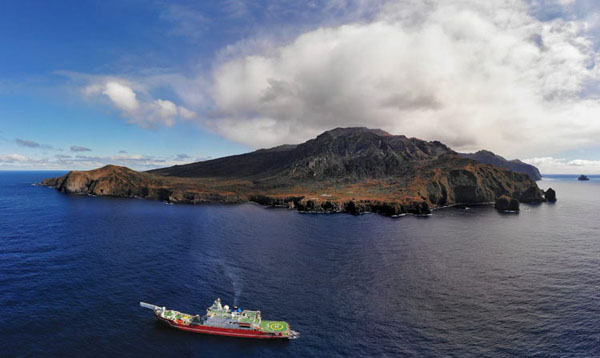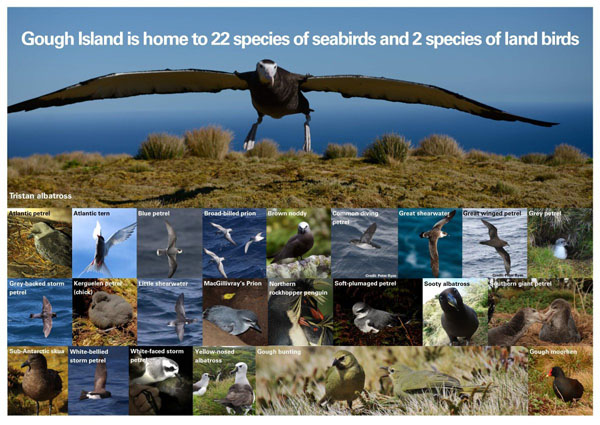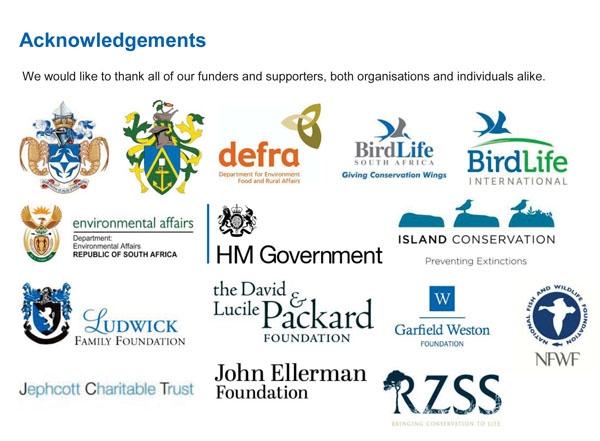Gough Restoration Project Update
Updated excerpts from RSPB Laura Beasley's article published in the February Tristan da Cunha Newsletter
For the full article please join the Tristan da Cunha Association to receive your copy and other in-depth features on the island which are not published on the website.
Gough Island Restoration 2020
The RSPB-led £9.1m project which aims to eradicate mice from Gough Island has started. This will be the RSPB's largest ever single undertaking, and one of the most ambitious island restorations ever attempted by anyone anywhere in the world.

Chris Jones' photo shows Gough Island from the SA Agulhas II helicopter in September 2019
The Gough Restoration Project Plan
The scale and complexity of the operation is immense: Moving four helicopters, hundreds of tonnes of equipment, and 40 extra staff to this remote, windswept location, thousands of miles from the UK.
The first operational team of 18 is travelling from Cape Town aboard the expedition sailing vessel Evohe on two trips to Gough Island in February and March 2020 to set up infrastructure and aviculture. This includes building aviaries for the land birds, along with a helicopter hangar and the extra housing and facilities required for the restoration team.
SA Agulhas II will depart from Cape Town in May with additional team members, equipment, stores and the helicopters.
The operation and the teams will be led overall by Pete McClelland, the Gough Island Restoration Operational Manager. Pete comes from New Zealand, where island restoration techniques have been refined over the last 50 or so years, a country known for its expertise in this field. Pete brings a wealth of experience to the project and has been a pivotal part of the successful Macquarie, Lord Howe, Big Green, and Rat Island restorations. A terrestrial observer from Tristan will be present on the island up to April 2020, and a fisheries observer from Tristan between May-August 2020.
Rodenticide bait will be dropped from helicopters between June and August 2020 as this is when there is less alternative food available for mice and the greatest number of seabirds are away from the island foraging at sea. A GPS system will ensure accurate and even bait placement across the island. We've carefully considered the risks involved in the operation, and as a precaution we will be taking a number of Gough moorhens and Gough buntings into temporary captivity on the island so that they can stay safely out of the way until the operation is complete. They'll be looked after by a highly experienced aviculture team.
Demobilisation will begin in August with personnel leaving the island on the Agulhas II. An RSPB team will remain on Gough for at least two years for any signs of mice before declaring Gough officially “mouse free”.
There will also be continued monitoring of the welfare and breeding success of the seabirds. In the absence of mice, an immediate improvement in breeding success is expected across several bird species.

RSPB poster showcasing the birds that will be protected from mice predation if the project is successful
Funding
The success of this operation cannot be guaranteed. But we cannot stand by and do nothing, and urgently need to raise money to cover costs as there is a significant shortfall.
If you can contribute to this vital seabird project please visit www.goughisland.com or contact the team at GoughIsland@rspb.org.uk
It is a case of now or never.
With RSPB the project partners are – Tristan da Cunha Government, the UK Government, the South African Department of Environment, Forestry and Fisheries, BirdLife South Africa, BirdLife International, Island Conservation, and the Royal Zoological Society of Scotland.
Thanks to the generosity of RSPB supporters, the UK Government, philanthropic individuals and foundations, and other project funders, the project will go ahead, but this commitment has pushed the limits of the RSPB's funds and therefore, the fund-raising continues urgently to cover the cost of the shortfall.

